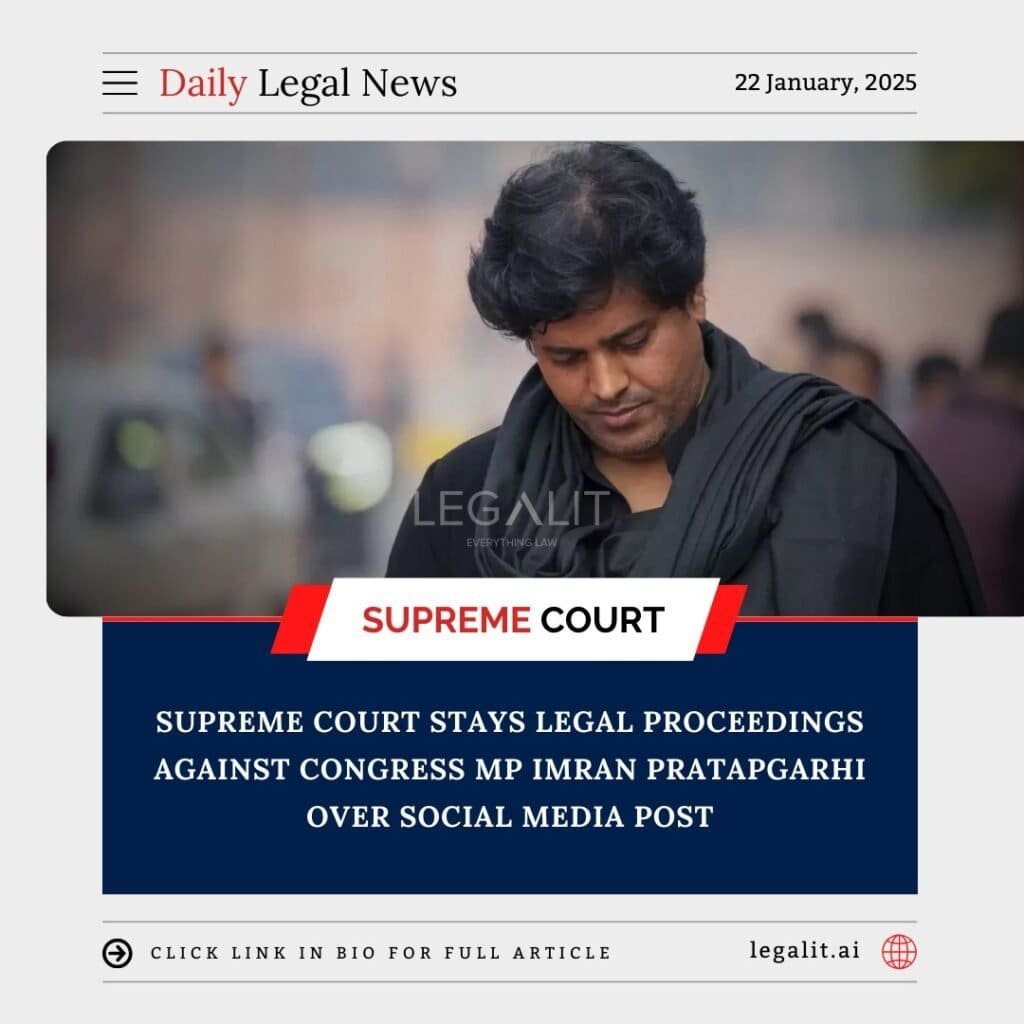
Background
In a significant development, the Supreme Court of India stayed the legal proceedings against Congress Member of Parliament (MP) Imran Pratapgarhi, who had been booked over a social media post. The case, which was filed by the Uttar Pradesh police, accuses Pratapgarhi of spreading provocative content that allegedly incited religious sentiments and disrupted public order. The MP had posted content on social media that the authorities claimed violated various provisions under the Indian Penal Code (IPC) and the Information Technology Act.
Pratapgarhi, in his defense, sought intervention from the Supreme Court, challenging the charges against him and arguing that his post was misinterpreted and does not warrant criminal prosecution. The court, after hearing both sides, granted an interim stay on the ongoing proceedings, thus providing temporary relief to the MP.
Court’s Observations
- Freedom of Expression:
- The Supreme Court noted that the matter at hand raised important questions regarding the balance between the right to freedom of speech and expression and the state’s interest in maintaining public order.
- It underscored the importance of exercising caution when interpreting the limits of freedom of expression in a democratic setup, especially when social media posts are involved.
- Protection from Harassment:
- The bench acknowledged the need to protect individuals from harassment and unnecessary legal proceedings based on subjective interpretations of their online content.
- It pointed out that criminalizing social media posts without proper investigation could set a dangerous precedent, leading to the misuse of legal provisions for political or personal vendettas.
- Due Process:
- The court also emphasized the importance of following due process in such cases, ensuring that the alleged offense is sufficiently proven before taking action.
- It highlighted that the state must provide clear evidence of how the social media post in question had incited violence or posed a tangible threat to public order.
Arguments by Imran Pratapgarhi’s Counsel
- Misinterpretation of Content: The counsel for Pratapgarhi argued that the social media post was taken out of context and that the MP had no intention of inciting violence or spreading communal hatred.
- Political Motivation: The defense also suggested that the case was politically motivated, intended to discredit Pratapgarhi due to his vocal stance on several political issues.
- No Public Harm: It was further argued that the post in question did not result in any significant harm to public order or incite violence, thereby not justifying criminal proceedings under the IPC and the IT Act.
Prosecution’s Stand
- Incitement to Violence: The prosecution argued that the content posted by the MP had the potential to incite violence, particularly among the communities mentioned in the post.
- Violation of Public Order: The authorities contended that the post violated provisions related to promoting enmity between different groups and disturbing public peace.
- Serious Nature of Allegations: The prosecution emphasized the gravity of the charges, asserting that such posts could have a widespread impact on societal harmony, especially in sensitive areas like Uttar Pradesh.
Broader Implications
- Legal Precedent on Social Media Posts:
- This case brings to the forefront the complex issue of regulating social media content and the extent to which individuals can be held accountable for their online statements.
- The ruling could set a precedent for how similar cases involving online content and political speech are handled in the future, particularly concerning the balance between free speech and public order.
- Impact on Political Discourse:
- The case highlights the challenges in political discourse, where public figures may face legal action for posts made on social media platforms.
- It raises questions about the potential for using legal measures as a tool to target political opponents, especially in highly charged political environments.
- Potential for Abuse of Laws:
- The stay granted by the Supreme Court may signal a shift in how courts address politically motivated cases, with greater scrutiny on whether legal provisions are being misused to suppress political expression.
- The case could prompt lawmakers to reconsider the application of certain sections of the law to ensure that they are not used to stifle dissent or restrict the right to free speech in the digital age.
Conclusion
The Supreme Court’s intervention in the case against Congress MP Imran Pratapgarhi serves as an important reminder of the need to carefully consider the implications of social media content and its potential to incite unrest. While the court has granted temporary relief to the MP, the case continues to raise critical issues about freedom of expression, political accountability, and the role of social media in contemporary legal and political landscapes. The outcome of this case could influence future legal strategies in similar matters, setting important precedents for the regulation of online speech in India.